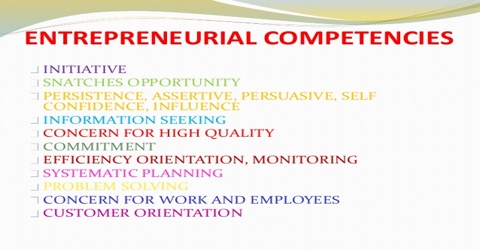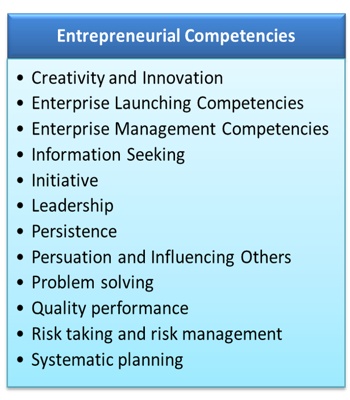Entrepreneurial Competencies
The term ‘competence’ refers to a composite of knowledge, skills and a host of psychosocial attributes in a person that mark his/her effectiveness for a task. The phrase ‘composite’ is crucial. For example, the competence “ability to communicate vision” is much more than proficiency in writing/ speaking skills. And an entrepreneur is an enterprising individual who builds capital through risk and initiative.
Initiative: Acting out of choice rather than compulsion, taking the lead rather than waiting for others to start.
Risk Mitigation: the taking of actions that reduce the probability of a risk occurring or reduce the potential impact if the risk were to occur.
Sees and Acts on Opportunities: A mindset where one is trained to look for business opportunities from everyday experiences. Recall ‘oranges’ example.
Resilience: the ability to cope with stresses and disturbances such that one remains well, recovers or even thrives in the face of adversity
Persistence: A ‘never say die’ attitude, not giving up easily, striving continuously until success is achieved.
Opportunity Recognition: the capacity to perceive changed conditions or overlooked possibilities in the environment that represent potential sources of profit or return to a venture
Information seeking: Knowing and knowing who knows, consulting experts, reading relevant material and an overall openness to ideas and information.
Concern for High Quality of Work: Attention to details and observance of established standards and norms.
Commitment to Work Contract: Taking personal pains to complete a task as scheduled.
Efficiency Orientation: Concern for conservation of time, money and effort.
Systematic Planning: Breaking up the complex whole into parts, close examination of the parts and inferring about the whole; e.g. simultaneously attending to production, marketing and financial aspects (parts) of the overall business strategy (the whole).
Problem-solving: Observing the symptoms, diagnosing and curing.
Self-confidence: Not being afraid of the risks associated with business and relying on one’s capabilities to successfully manage these.
Assertiveness: Conveying emphatically one’s vision and convincing others of its value.

















